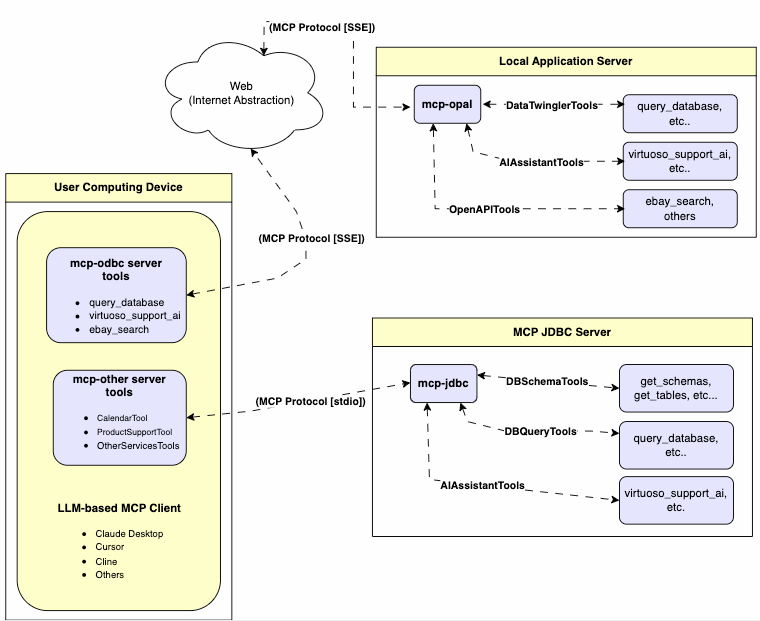
Java based Model Context Procotol (MCP) Server for JDBC
Java based Model Context Procotol (MCP) Server for JDBC
What is MCP JDBC Server?
MCP JDBC Server is a lightweight Model Context Protocol (MCP) server designed for JDBC, built with Quakrus. It is compatible with Virtuoso DBMS and other databases that support JDBC drivers.
How to use MCP JDBC Server?
To use the MCP JDBC Server, clone the repository from GitHub, configure the environment variables in the .env file, and run the server using Java. You can then access various tools provided by the server for database operations.
Key features of MCP JDBC Server?
- Fetch and list all schema names from the connected database.
- Retrieve table information for specific schemas.
- Generate detailed descriptions of table structures, including column names and data types.
- Execute SQL queries and stored procedures with results in JSONL or Markdown format.
Use cases of MCP JDBC Server?
- Listing and managing database schemas and tables.
- Executing complex SQL queries and retrieving structured results.
- Integrating with applications that require database interactions via JDBC.
FAQ from MCP JDBC Server?
- What databases are supported by MCP JDBC Server?
MCP JDBC Server is compatible with Virtuoso DBMS and any other database that has a JDBC driver.
- Is there a specific Java version required?
Yes, MCP JDBC Server requires Java 21 or above.
- How can I troubleshoot issues with the server?
You can install the MCP Inspector for easier troubleshooting and start it with the server command.
Java based Model Context Procotol (MCP) Server for JDBC
A lightweight MCP (Model Context Protocol) server for JDBC built with Quakrus . This server is compatible with Virtuoso DBMS and other DBMS backends that has JDBC driver.

Features
- Get Schemas: Fetch and list all schema names from the connected database.
- Get Tables: Retrieve table information for specific schemas or all schemas.
- Describe Table: Generate a detailed description of table structures, including:
- Column names and data types
- Nullable attributes
- Primary and foreign keys
- Search Tables: Filter and retrieve tables based on name substrings.
- Execute Stored Procedures: In the case of Virtuoso, execute stored procedures and retrieve results.
- Execute Queries:
- JSONL result format: Optimized for structured responses.
- Markdown table format: Ideal for reporting and visualization.
Prerequisites
MCP server requires Java 21 or above.
Installation
Clone this repository:
git clone https://github.com/OpenLinkSoftware/mcp-jdbc-server.git
cd mcp-jdbc-server
Environment Variables
Update your .envby overriding the defaults to match your preferences
jdbc.url=jdbc:virtuoso://localhost:1111
jdbc.user=dba
jdbc.password=dba
jdbc.api_key=xxx
Configuration
For Claude Desktop users:
Add the following to claude_desktop_config.json:
{
"mcpServers": {
"my_database": {
"command": "java",
"args": ["-jar", "/path/to/mcp-jdbc-server/MCPServer-1.0.0-runner.jar"],
"env": {
"jdbc.url": "jdbc:virtuoso://localhost:1111",
"jdbc.user": "username",
"jdbc.password": "password",
"jdbc.api_key": "sk-xxx"
}
}
}
}
Usage
Tools Provided
After successful installation, the following tools will be available to MCP client applications.
Overview
| name | description |
|---|---|
| jdbc_get_schemas | List database schemas accessible to connected database management system (DBMS). |
| jdbc_get_tables | List tables associated with a selected database schema. |
| jdbc_describe_table | Provide the description of a table associated with a designated database schema. This includes information about column names, data types, nulls handling, autoincrement, primary key, and foreign keys |
| jdbc_filter_table_names | List tables, based on a substring pattern from the q input field, associated with a selected database schema. |
| jdbc_query_database | Execute a SQL query and return results in JSONL format. |
| jdbc_execute_query | Execute a SQL query and return results in JSONL format. |
| jdbc_execute_query_md | Execute a SQL query and return results in Markdown table format. |
| jdbc_spasql_query | Execute a SPASQL query and return results. |
| jdbc_sparql_query | Execute a SPARQL query and return results. |
| jdbc_virtuoso_support_ai | Interact with the Virtuoso Support Assistant/Agent -- a Virtuoso-specific feature for interacting with LLMs |
Detailed Description
-
jdbc_get_schemas
- Retrieve and return a list of all schema names from the connected database.
- Input parameters:
user(string, optional): Database username. Defaults to "demo".password(string, optional): Database password. Defaults to "demo".url(string, optional): JDBC URL connection string.
- Returns a JSON string array of schema names.
-
jdbc_get_tables
- Retrieve and return a list containing information about tables in a specified schema. If no schema is provided, uses the connection's default schema.
- Input parameters:
schema(string, optional): Database schema to filter tables. Defaults to connection default.user(string, optional): Database username. Defaults to "demo".password(string, optional): Database password. Defaults to "demo".url(string, optional): JDBC URL connection string.
- Returns a JSON string containing table information (e.g., TABLE_CAT, TABLE_SCHEM, TABLE_NAME, TABLE_TYPE).
-
jdbc_filter_table_names
- Filters and returns information about tables whose names contain a specific substring.
- Input parameters:
q(string, required): The substring to search for within table names.schema(string, optional): Database schema to filter tables. Defaults to connection default.user(string, optional): Database username. Defaults to "demo".password(string, optional): Database password. Defaults to "demo".url(string, optional): JDBC URL connection string.
- Returns a JSON string containing information for matching tables.
-
jdbc_describe_table
- Retrieve and return detailed information about the columns of a specific table.
- Input parameters:
schema(string, required): The database schema name containing the table.table(string, required): The name of the table to describe.user(string, optional): Database username. Defaults to "demo".password(string, optional): Database password. Defaults to "demo".url(string, optional): JDBC URL connection string.
- Returns a JSON string describing the table's columns (e.g., COLUMN_NAME, TYPE_NAME, COLUMN_SIZE, IS_NULLABLE).
-
jdbc_query_database
- Execute a standard SQL query and return the results in JSON format.
- Input parameters:
query(string, required): The SQL query string to execute.user(string, optional): Database username. Defaults to "demo".password(string, optional): Database password. Defaults to "demo".url(string, optional): JDBC URL connection string.
- Returns query results as a JSON string.
-
jdbc_query_database_md
- Execute a standard SQL query and return the results formatted as a Markdown table.
- Input parameters:
query(string, required): The SQL query string to execute.user(string, optional): Database username. Defaults to "demo".password(string, optional): Database password. Defaults to "demo".url(string, optional): JDBC URL connection string.
- Returns query results as a Markdown table string.
-
jdbc_query_database_jsonl
- Execute a standard SQL query and return the results in JSON Lines (JSONL) format (one JSON object per line).
- Input parameters:
query(string, required): The SQL query string to execute.user(string, optional): Database username. Defaults to "demo".password(string, optional): Database password. Defaults to "demo".url(string, optional): JDBC URL connection string.
- Returns query results as a JSONL string.
-
jdbc_spasql_query
- Execute a SPASQL (SQL/SPARQL hybrid) query return results. This is a Virtuoso-specific feature.
- Input parameters:
query(string, required): The SPASQL query string.max_rows(number, optional): Maximum number of rows to return. Defaults to 20.timeout(number, optional): Query timeout in milliseconds. Defaults to 30000.user(string, optional): Database username. Defaults to "demo".password(string, optional): Database password. Defaults to "demo".url(string, optional): JDBC URL connection string.
- Returns the result from the underlying stored procedure call (e.g.,
Demo.demo.execute_spasql_query).
-
jdbc_sparql_query
- Execute a SPARQL query and return results. This is a Virtuoso-specific feature.
- Input parameters:
query(string, required): The SPARQL query string.format(string, optional): Desired result format. Defaults to 'json'.timeout(number, optional): Query timeout in milliseconds. Defaults to 30000.user(string, optional): Database username. Defaults to "demo".password(string, optional): Database password. Defaults to "demo".url(string, optional): JDBC URL connection string.
- Returns the result from the underlying function call (e.g.,
"UB".dba."sparqlQuery").
-
jdbc_virtuoso_support_ai
- Utilizes a Virtuoso-specific AI Assistant function, passing a prompt and optional API key. This is a Virtuoso-specific feature.
- Input parameters:
prompt(string, required): The prompt text for the AI function.api_key(string, optional): API key for the AI service. Defaults to "none".user(string, optional): Database username. Defaults to "demo".password(string, optional): Database password. Defaults to "demo".url(string, optional): JDBC URL connection string.
- Returns the result from the AI Support Assistant function call (e.g.,
DEMO.DBA.OAI_VIRTUOSO_SUPPORT_AI).
Troubleshooting
For easy troubleshooting:
-
Install the MCP Inspector:
npm install -g @modelcontextprotocol/inspector -
Start the inspector:
npx @modelcontextprotocol/inspector java -jar /path/to/mcp-jdbc-server/MCPServer-1.0.0-runner.jar
Access the provided URL to troubleshoot server interactions.